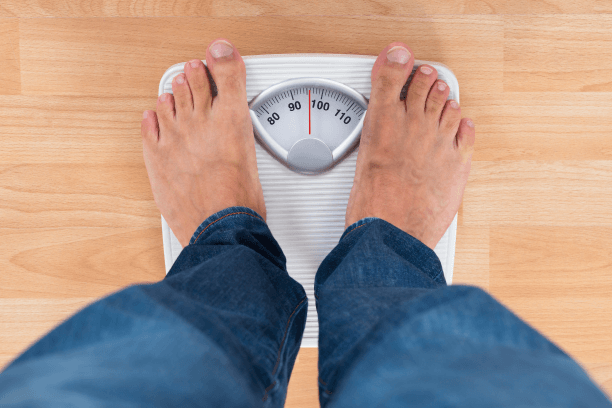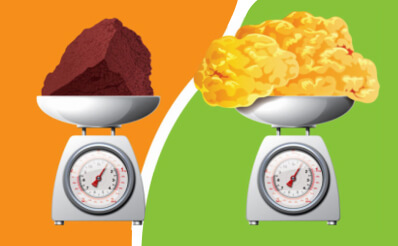Lifestyle, Motivation, Weight Loss
Fat (Inch) Loss Or Weight Loss | Possible
You are on a weight loss program, started losing weight as targeted initially but after some weight loss, you observe that scale is not moving. Has this happened to you?
Then you are not alone, many individuals experience this during their weight loss journey. Why this could be happening?
Table of Content
Understanding Weight Loss
Body weight as shown on the scale is sum total of the weight of the muscles, fat, bone tissue, internal organs, and water. When we see weight loss on the scale, it would be the loss of fat, muscle, and water.
Weight loss = Fat loss + Muscle loss + Water loss
Water Weight
Approximately 60% of our total body weight is water. For example, a 100kg person carries 50-60 kgs of water as different constituents of our body.
The amount of water retained in the body fluctuates based on many factors like muscle and fat percentage, dietary habits, type and amount of exercise, total fluid intake, menstrual phase, hormonal disturbances etc.

High salt foods can trigger our cells to absorb water like a sponge.
A high carb meal can trigger a higher than normal levels of insulin in your blood, which can make the body retain sodium that makes the cells absorb more water.
The extra carbs from the meal will be typically stored as energy for future use by the body.
Each gram of extra carb stored as glycogen will retain 3 gms of water. This is why we feel bloated and heavy after a carb-rich meal.
Fat and Muscle mass
Muscle tissue is three-fourths water and is more dense than fat. This means that 1 kg of muscle will occupy less space than 1kg of fat.
To be more precise, muscle is 1.06 kg per liter of space and fat density is 0.9196kg per liter of space.

If you gain 10kg muscle and at the same time lost 10kgs of fat, you will be thinner and smaller by about 1.4 liters. You might weigh the same but your clothes will be looser.
We can take an example of two individuals A and B, who started on a weight loss journey. After 5 months, A lost 10kgs by eating healthy and exercising regularly. B lost 12 kgs by being on liquid diets, or other starvation diets.
A’s 10kg weight loss might be equal to 10 kg muscle gain with 15-20 kg fat loss. In this case, A could be 12.3 liters smaller.
B on the scale would have lost 12 kgs, which might be 10kgs of muscle and 2-3 kgs of fat. He might be happy with the results, but in reality, he is fatter and bigger compared to A.
With more muscle, A will burn more calories going forward, maintaining his weight loss more efficiently than B. According to research one kg of muscle burns about 10 kcal/kg per day.
The Concept of Fat Loss
Fat is stored in the body in special cells- adipocytes, present beneath the skin, around visceral organs, muscles and breast tissues. The presence of fat is important to an extent as it helps in maintaining body temperature, protecting vital organs and biosynthesis of hormones.
The ideal percentage of body fat in a female is 25-31% and in males is 18-24%
Fat Loss = Loss of stored fat from the body
It’s actually the fat percentage that determines the health and fitness level of the body. More muscle mass helps in burning extra fat and therefore, helps in attaining the fitter version of you.
There could be many other factors, which could impact weight loss, but the message here is losing fat might not reflect on the scale.
Fat loss can be assessed more by the fit of your clothes, inches lost, how healthy you feel, your energy levels. The scale will reflect this over a long period of time.
Bottom line-
When you weigh yourself on the weighing scale, it gives you a number which might not actually reflect the fat loss or muscle gain.
You are happy to lose weight assuming its only fat and unhappy with no weight loss again assuming that there is no fat loss.
When our scale says weight, it is not only fat. It would be water, carbohydrates from the diet or even muscle gain.
Takeaway
Eating right, exercising regularly and making lifestyle changes will show results though not always on the scale but in long run, for sure.
Submitted By,
Suhasini Mudraganam
Chief Nutritionist, Possible
Suhasini Mudraganam is a leading food scientist who was instrumental in designing the Possible Food plan. She has done her MS in Nutrition from the University of Missouri, USA and has over 14 years of global experience.

Hey i been trying to loss weight for a year now i have seen some less weight.
Hi Chris! We would like to inform you that our program helps you in weight-loss. Go through the link and download the book, which explains and gives you tips to lose weight. Keep following our blog to know more health information. https://get.truweight.in/indian-weightloss-diet-ebook-download/
Cool
I loved what you shared about the differences between losing weight and losing fat. Thank you
Hi Almanza! We are glad to know that you liked the information provided in this article. Keep following our blog to know more health information.